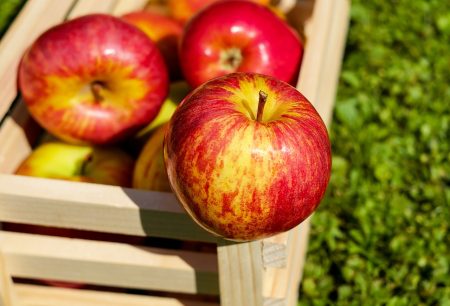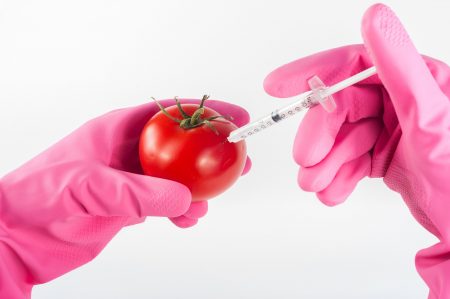An Apple is Not Just an Apple Any Longer
When Whole Food May Be Harming Your Child
(if you just want to know the impact on children, scroll down to the heading “ Why are children more susceptible to GMO foods than adults”)
Eating an apple may seem very healthy and it was for much of history until the mid-1990’s when our food started to change. GMO’s (genetically modified organisms) were first introduced in 1996.
What may look like a healthy apple may be covered pesticides and herbicide residue. The Environmental Working group found that 90% of the apples tested still had pesticide residue after washing. (1)
Many will tell you these amounts are so small that they are harmless and cannot hurt you. But what about over time, eating GMO foods that are heavily sprayed? Even though I have heard over and over that these toxins are harmless, the more research I do, the less I find this to be true.
Did you know that when they look at the safety of these chemicals, they never look at how these chemicals react together synergistically? No, they look at the safety of each chemical in isolation. Thus, no one is looking at the impact that an innocent apple can have on the health of your child’s tiny body. While studies on the synergistic impact have not been done on humans, when done on amphibians, they experienced 100% mortality (12)
What impact do these chemicals have when ingested all at once in a child who say weighs only 50 pounds? I have talked to farmers and ranchers who do use GMO feed and chemicals to spray their crops. They insist that the amounts are so small that they are harmless. We need to look at the cumulative impact these toxins are having over time.
I think after reading this article you may realize that the chemicals we are ingesting are not as safe as we may have been led to believe.
What Does It Mean If a Food Is a GMO?
GMO stands for genetically modified organism. What this means is that scientists remove one or more genes from the DNA of another organism such as from another animal and then recombine them into the DNA of the plant they want to alter. By doing so, they hope that the plant will express traits associated with the genes. (11)
Genetic engineering is not the same as plant breeding. Plant breeders work with plants in the same species to create new plant varieties. For instance, you breed a pig with a pig to get a new pig variety but with GMO technology they have, for example, spliced fish genes into tomatoes. This means that the tomato now has traits that would be impossible to obtain under natural processes such as crossbreeding or grafting. (13)
While some GMO farmers and biotech supporters will tell you that we have been doing genetic engineering for hundreds of years, this is false. Prior to 1995 there were no GMO crops in the US. (10)
It is estimated that now 70-75% of all grocery store products contain at least one genetically modified ingredient. The odds you are consuming GMO foods daily without even realizing it is high. (10)
Proteins in engineered plants are often damaged proteins which can be toxic or allergenic. Since genes are the blueprint for making protein we must wonder if these new and possibly damaged proteins are causing more autoimmune conditions and more allergies and food sensitivities. (10)
Not only should you be concerned about the actual new plant created but also what it can withstand. There have been two main traits added to GMO crops which are herbicide tolerance and the ability of the plant to produce its own pesticide. With herbicide tolerance, farmers can now spray the entire crop with roundup and other herbicides. These new plants can withstand these harsh chemicals so that only the weeds around them will die. This may sound great but realize that you now consume fruit, soy, corn, and veggies that are covered in these chemicals. Some maybe you can wash off, but others get absorbed deep into the food so no matter how much you wash it, the chemicals are still there. (13)
Some crops produce its own insecticide. This means that insects that try to eat the plant will die. These plants can be toxic not just to these insects. Farmers in India who let their sheep graze on bt cotton (GMO cotton) plants after harvest, saw thousands of sheep die. (13)
Some Toxins to Be Concerned About
Both pesticides and herbicides can be applied directly to plants or to the soil
Even some non-GMO crops can be contaminated. For instance, glyphosate is also used as a desiccant. It is sprayed on crops right before harvest to dry them out. Wheat, while not a GMO crop is a heavily sprayed crop. (14) So is coffee.
Herbicides: These are used on plants to destroy weeds. These work by imitating the plants hormones. If that is the case, when we consume foods with herbicides on them, can our hormones get disrupted as well? Herbicide toxicity may be linked to an increase in birth defects in countries where large amounts of wheat are grown and babies that are conceived in the spring time when the nearby crops are being sprayed. (3)
Pesticides: This is a general term that includes insecticides, herbicides fungicides. (15)
Organophosphate: This is a class of pesticides that affects the nervous system. They were developed prior to WWII as nerve gas. (15)
Neonicotinoid: This is another class of pesticides and a relatively new class. They are used heavily as a replacement for older pesticides that have lost their effectiveness. It is implicated in the honeybee deaths and colony collapse disorder. (15)
Atrazine: This is the most commonly used herbicide and has been linked to disruption of the endocrine system, immune system and nervous system. It is also linked to ADHD (4)
Thiabendazole: This is a developmental and reproductive toxin as well as a probable carcinogen. (1)
Chlorpyrifos: This is a type of organophosphate pesticide that was almost banned by the EPA in 2017 because of its potential to cause neurodevelopmental harm to children. However, before the ban could be enacted it was overturned by the current administration. (1)
Glyphosate: This herbicide, I am sure you have heard of. It is one of the main ingredients in Round Up that you may have in your garage or shed right now. This has been declared a probable known carcinogen in 2015. Its use goes back to the 1970’s. Currently, there are traces of it in almost every food product you eat, from granola, crackers, honey and oatmeal. (2)
The EWG used more stringent standards and looked at 45 samples of products made with conventionally grown oats to look at the glyphosate content. They found glyphosate in all, but two oat products tested. They concluded that products with excessive levels of herbicides include Quaker Old-Fashioned Oats, Cheerios, Quaker Dinosaur Egg Instant Oats, Great Value Instant Oats, and Back to Nature Classic Granola. (5)
Many of these chemicals cannot be washed off and especially there is no way to remove them from your packaged and processed foods.
13 Reasons Why You Should Avoid GMO Foods
- Because of the impact these toxins can have over time on the body (cumulative impact is still not fully understood but why risk it and why put these toxins into the tiny bodies of children)
- GMOs may reduce the effectiveness of antibiotics
- There are no specific tests created (yet) to analyze the long- term safety of GMO consumption in humans.
- Increase in pesticide use has contributed to die- off of bees and colony collapse disorder. (we need bees- they pollinate over 30% of the food we eat.) It also impacts other insects such as monarch butterflies and thus can impact our entire ecosystem.
- Increase use of pesticides causes superweeds-weeds that are resistant to these very pesticides! This leads to more and stronger pesticide use!
- Human studies have shown we do not detoxify all GMO materials
- Most of the health risks from GMO crops goes largely ignored by government regulations and safety assessments. The FDA doesn’t require any safety studies and does not required GMO labeling. As a side note, the head of US Food and Safety is Michael Taylor who was once the attorney for and later the VP for Monsanto.
- When independent research is done, attempts to report it have been gagged, or threats made or funds denied. Attempts to make the public aware of GMO’s often gets censored.
- GMO’s do not increase yield, they are not the answer to feed the world! This was made clear in the Union of Concerned Scientists 2009 report Failure to Yield-the definitive study to date on GMO crops and yield.
- Animal studies indicate GMOs can pose risks: infertility, immune system issues, accelerated aging, insulin dysregulation, changes in major organs and gut function. (read Seeds of Deception by Jeffrey Smith).
- Farmers cannot reuse GE seed. This technology threatens the lives of over 1.4 billion people who rely on saved seeds.
- Studies that say GMO’s are harmless, are safe to consume all are done by the large biotech companies. The FDA does not replicate these studies but rather they rely on the results from the biotech companies.
- There are no long- term human studies showing that GMO foods are safe. There are studies from Russia and Europe that show rats fed engineered food die prematurely. (6,7, 8, 9)
GMO’s, Your Gut and Depression
If you have read anything I have written, by now you know the importance of gut health for mental health as the two are intertwined and dependent upon one another. More “good” bacteria in the gut and more diversity (more strains) in the gut can mean less depression, anxiety, ADHD, less autisim risk and so forth. When gut health is out of balance it can also lead to leaky gut (intestinal permeability), which can lead to systemic inflammation, food sensitivities and autoimmune conditions.
What does this have to do with GMO foods, and the toxins they may contain?
Well, glyphosate, the main ingredient in Roundup and the most used herbicide globally was also patented as an antibiotic. (18) I’m sure you know how antibiotics can destroy all the bacteria in your gut, not just the bad ones. So what happens when you consume very small amounts of antibiotics in the form of glyphosate on your foods over and over numerous times every day? What impact is this having on our children?
Not sure what leaky gut is? Read this post http://trufoodsnutrition.com/leaky-gut-syndrome-what-it-is-and-what-causes-it/
Not only can GMO foods and foods sprayed with herbicides destroy your microbiome but they are also depleting the soil. This means that over time the soil is less mineral rich and thus the food is also not as nutritious. (18).
If you are dealing with a mental health disorder I urge you to eat organic if you can afford it. If not, then decide which foods you will buy organic and add in a quality probiotic and eat foods rich in prebiotics and fermented foods for their probiotic content.
Why Are Children More Susceptible to GMO Foods Than Adults?
The American Academy of Pediatrics has reiterated, based on a growing body of scientific literature, that pesticide exposure is linked to chronic health complications in children, including neurodevelopmental and behavioral problems, birth defects, asthma, and cancer.
Most insecticides have neurotoxic potential and children can be especially vulnerable because of their stages of development, difference in metabolism, and inability to detoxify compounds. Their bodies have lower levels of detoxifying enzymes that deactivate widely used pesticides. Their immune and nervous systems are also still developing so this too increases their vulnerability.
Infants and children also eat more per pound of body weight than adults, so they are consuming more of these toxins.
The National Institute of Health (NIH) has stated their concerns that animal studies show even a single low- level exposure to certain organophosphates during times of early brain development can cause permanent changes in brain chemistry as well as changes in behavior including hyperactivity. They have stated that the impact on children can lead to long lasting impact on learning, attention and behavior.
Research is showing adverse effects on the neurological development of children who are exposed to these organophosphate pesticides from food they eat. A 2000 study by researchers at Harvard found that children with higher levels of organophosphate pesticide metabolites in their urine were more likely to be diagnosed with ADHD.
There are other pesticides that belong to the neonicotinoid class are supposedly safer, yet these also target the nervous system and are potentially harmful.
(15)
Avoid Conventional Forms of These Foods
- Corn (not corn on the cob, but corn as a grain), corn oil, cornmeal, cornstarch, corn syrup, polenta, hominy,
- Canola oil
- Cottonseed oil
- Sugar beets (sugar in your products or bags of white sugar)
- Soy bean oil, soy protein, soy lecithin, soy milk, tofu,
- Alfalfa (given to livestock-you are what your food eats)
- Apples
- Papaya
- Potatoes (especially russet)
- Conventional meats (fed GMO grains)
- Aspartame
- Yellow squash and zucchini
- Conventional dairy (rBGH) (recombinant bovine growth hormone)
- Eggs (chickens fed GMO grains)
How to Reduce Your Exposure
Sadly, most of us have these toxins in our bodies right now. The best we can do is make the best choices for us and our families.
If you are on a budget visit www.ewg.org and keep their clean 15/dirty dozen list handy so that you can avoid buying conventionally the foods that contain the most contaminant residue. Buy organic in bulk and from the frozen section. You don’t need to buy everything organic. If you can’t afford organic meats, then reduce your meat consumption and learn to cook more with beans and legumes as a protein source.
Wash your fruit and veggies and peel the outer leaves on say heads of lettuce or cabbage. Wash even your organic produce as chemicals used on neighboring farms can still contaminate organic crops unfortunately. If you do use the peel say on lemons to make zest, then use organic.
Use the list above as a guide for what to avoid non-organic. Look for the verified non-GMO seal on packaged products. Learn to read labels so that you can identify sources of GMO’s in your packaged foods.
Still Unsure?
Supporting non-GMO products is not a “belief” issue but rather looking at the science behind it. Sadly, much of the GMO research showing its safety has been done by biased parties who have a vested interest in their findings. Much of the information regarding GMO safety has been done by those benefiting financially. Also, GMO’s are not just about the science behind it but the technology as well. There are corporations who are making huge amounts of money off of GMO’s. This is not necessarily bad, but do they have your best interest in mind? Probably not. Not only may they not have your health in mind but that of our environment as well. (16)
If still unsure I urge you to do your own research. When looking at studies, look to see where the funding comes from. (16) Also, understand that many articles are written by “ghost writers” which means the actual companies that have the vested interest are the actual writers. For instance, the benefits of a medication may actually be written by the pharmaceutical company that profits from its sale. (17)
Bottom Line
GMO foods have not been proven to be safe. We do not know the long- term impact on society, the environment, on us and our children. While GMO’s are probably not the sole reason for the increase in autoimmune conditions, food sensitives, allergies, ADHD and other health disorders, we need to consider that they may be playing a large role in them.
Sources
- Isley, C. For the Love of Organic. The Cost of Conventional. Natural Grocers, Oct 2018, issue 17.
- https://nypost.com/2018/04/30/pesticide-linked-to-cancer-is-in-nearly-every-us-food-report/
- http://www.ourstolenfuture.org/newscience/oncompounds/chlorophenoxy/2003/2003-0712schreinemachers.htm
- http://tih.sagepub.com/content/15/1-2/133.abstract
- https://www.cbsnews.com/news/glyphosate-roundup-chemical-found-in-childrens-breakfast-foods/
- https://www.nongmoproject.org/blog/6-reasons-to-avoid-gmos/
- https://responsibletechnology.org/10-reasons-to-avoid-gmos/
- https://www.ncbi.nlm.nih.gov/pmc/articles/PMC1392248/
- https://foodrevolution.org/blog/former-pro-gmo-scientist/
- http://whfoods.org/genpage.php?tname=dailytip&dbid=345
- http://non-gmoreport.com/what-is-non-gmo-what-are-gentically-modified-foods/
- https://www.researchgate.net/publication/311874994_Synergistic_Effects_of_a_Combined_Exposure_to_Herbicides_and_an_insecticide_in_Hyla_versicolor_Synergistic_Effects_of_a_Combined_Exposure_to_Herbicides_and_an_insecticide_in_Hyla_versicolor_Multiple_S
- https://responsibletechnology.org/gmo-education/faqs/
- https://www.nutraingredients-usa.com/Article/2018/10/09/MegaFood-leads-petition-asking-EPA-to-ban-pre-harvest-use-of-glyphosate?
- https://article.images.consumerreports.org/prod/content/dam/cro/news_articles/health/CR_FSASC_FromCroptoTablePesticides_Mar2015.pdf
- http://www.gmosrevealed.com/does-questioning-the-safety-of-gmos-make-you-antiscience/?
- https://lawrepository.ualr.edu/cgi/viewcontent.cgi?article=1041&content=lawreview
- https://article.mercola.com/sites/articles/archive/2017/12/05/glyphosate-linked-to-antibiotic-resistance.aspx








Leave A Comment
You must be logged in to post a comment.